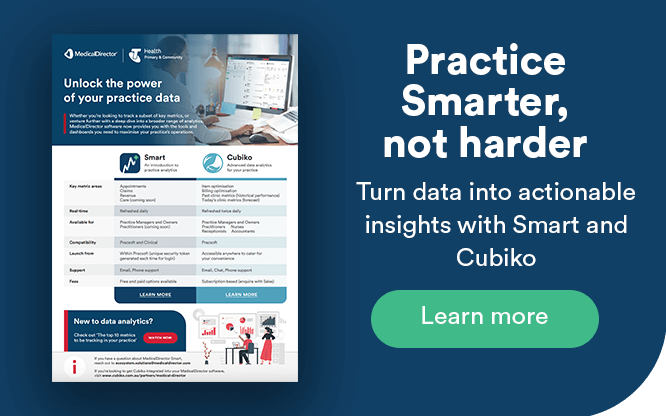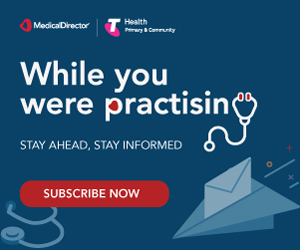5 Signs you’re a digitally savvy practice manager
The digital age is quickly revolutionising medical practice management, and there are numerous innovations a digitally savvy practice manager needs to know to keep up with the trends in health digital transformation.
In this article, we take a look at five tell-tale signs of a practice manager that knows what it takes to keep a practice agile and streamlined in today’s fact-evolving digital health ecosystem.
1. You implement cloud-based software
MedicalDirector’s whitepaper, Interoperability in healthcare: Synergising an industry, found a significant benefit of moving towards cloud-based solutions is that it supports more interoperable systems, which in turn benefits coordinated care and improved patient outcomes.
A digitally savvy practice manager knows that innovative cloud-based practice management solutions are set to takeover server-based practice management, as they support increased collaboration in healthcare, allowing multiple stakeholders to share information securely and seamlessly across the network.
For instance, We Care Medical Centre’s practice director and owner, Ram S. Annamalai, leverages cloud-based practice management software Helix to ensure the practice has an easy to use, flexible and mobile solution from the very start, freeing up more time to focus on growing the practice and enabling better patient care.
“Overall the accessibility and execution of Helix was quite easy,” Ram Annamalai said. “We worked closely with our project implementation manager from MedicalDirector to get up and running with Helix, and we also received hands on training, which helped from both clinical and administrative perspectives.”
2. You manage bookings with SMS alerts
Text alerts are an effective way of reducing practice time and money wasted as a result of clients forgetting an appointment. In December 2017, the Behavioral Economics Team of the Australian Government ran a study looking at the effective use of SMS. They discovered it took an average of 10.5 minutes to restore a cancelled payment. It also found a timely SMS reminder to pay on time, saved 240 hours of staff time per fortnight. Those 240 hours could then be re-allocated to assist others in need, lower the burden on phone services, and improve overall service delivery for Australians.
This research has proved that reminders help people recall and attend to an immediate deadline for an otherwise forgotten or postponed task. If you implement an automated SMS system, you will have regular touchpoints with those renowned for being late, or not showing up, and in turn provide availability to those in need, so they can make the most of an unexpected empty slot.
3. You automate workflow management
Fax, paper and outdated workflow systems are a major frustration for both GPs and practice managers, and with fax still as one of the main methods of communication between all healthcare professionals, the status quo simply won’t keep up with the rapid pace of technology. A practice manager that implements workflow automation, not only frees up valuable time to focus on more complex matters, but helps open up more time for GPs to offer better, patient-centric care.
“The more automated services we put into place, like streamlining bookings, automated reminders, systems that automatically text patients, solutions like HotDoc– all of these can help a lot,” Dr Charlotte Middleton, GP and Chief Medical Advisor at MedicalDirector, says. “We need to digitise our records more and think about increasing our interoperability between healthcare professionals and institutions.”
4. You take security and privacy seriously
Sensitive patient data is becoming an increasing hot topic, and with new laws now in place tackling cyber security breaches, the pressure is on practice managers to embrace more robust, protected data management and storage solutions.
According to MedicalDirector’s latest Patient Engagement Survey 2018, conducted in partnership with online appointment and eHealth platform, HotDoc, patients value both privacy and security as a top priority in healthcare.
In fact, when it comes to accessing medical health records, over 90% of respondents agreed both security (availability, accuracy, safety and integrity of data) and privacy (confidentiality and appropriate use of data) are extremely important.
For practice managers serious about future-proofing their practice management system, strengthening data protection benefits everyone and helps to reduce the risk of regulatory burdens, financial losses, damaged reputation, and loss of patient trust.
All healthcare organisations need a proactive approach when it comes to managing personal information and develop a culture ingrained in data privacy, ensuring that any patient information collected is treated as an asset to be protected and managed with the utmost care.
5. You implement an integrated solution
As your practice becomes busier and grows, the right practice management solution needs to be scalable and adapt to your changing needs. One example of a busy and growing medical practice network getting it right is the Family Doctor, who are a GP-owned network of medical practices spread right across Australia – and growing. The Family Doctor uses Pracsoft by MedicalDirector across 11 sites, all of which are seamlessly integrated with transaction and payment system, Tyro.
“We really like how MedicalDirector’s software and Tyro integrate seamlessly. They work well together and are both very stable, fast and easy to use. Features like online reporting, the ease of setup and ongoing support also make our clinics more efficient as we continue to grow. We’ve even had patients comment on how streamlined our payment and patient experience is for them.” Jennifer Surie, Operations Manager, at Family Doctor, said.










